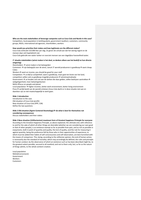Who are the main stakeholders of beverage companies such as Coca-Cola and Nestle in this case?
Competitors, local population in bottling plants, government (auditor), customers, community
groups, NGOs, international aid agencies, shareholders, workers
How would you prioritize their stakes and how legitimate are the different stakes?
Coca-Cola verbruikt 510.000 liter per dag. Ze geven de schuld aan dat het weinig regent en de
mensen daar anti kapitalistich zijn
Coca-Cola gebruikt een water tanker en voorziet mensen van een dagelijkse hoeveelheid water.
1e situatie stakeholders (winst maken is het doel, ze denken alleen aan het bedrijf en hun directe
omgeving)
Shareholders winst maken is het belangrijkst
Customers zijn belangrijk voor de winst, vanuit 3e wereld produceren is goedkoop want cheap
Cokes
Workers want an income, you should be good for your staff
Competitors zo blijf je competitief, want is goedkoop, maar gaat ten koste van het land,
competitors willen ook zo goedkoop mogelijk produceren winstmaximalisatie
Government ze houden zich net aan de wetten die daar gelden, willen bedrijven aantrekken
wekgelegenheid, meer belastinginkomen
NGOsfocus on people and planet
Local population higher incomes, better work environment, better living environment
Press eerlijk beeld van de wereld schetsen (Coca-Cola dacht er in deze situatie niet aan en
daardoor zijn ze niet maatschappelijk te werk gaan.
Slide 1 Introduction
Introduction to the case.
Old situation of Coca-Cola (profit)
New situation of Coca-Cola (PPP, CSR)
Define the two questions
Slide 2 Old situation (Agent-Centered Deontology) do what is best for themselves not
considering consequences
Discuss stakeholders and their stakes
Slide 3 New situation (Utilitarianism) maximum form of Greatest happiness Prinicple for everyone
According to the Greatest Happiness Principle, as above explained, the ultimate end, with reference
to and for the sake of which all other things are desirable (whether we are considering our own good
or that of other people), is an existence exempt as far as possible from pain, and as rich as possible in
enjoyments, both in point of quantity and quality; the test of quality, and the rule for measuring it
against quantity, being the preference felt by those who in their opportunities of experience, to
which must be added their habits of self-consciousness and self-observation, are best furnished with
the means of comparison. This, being, according to the utilitarian opinion, the end of human action,
is necessarily also the standard of morality; which may accordingly be defined, the rules and precepts
for human conduct, by the observance of which an existence such as has been described might be, to
the greatest extent possible, secured to all mankind; and not to them only, but, so far as the nature
of things admits, to the whole sentient creation.
Local population
NGOs(Environment)
Government
Workers
Customers




